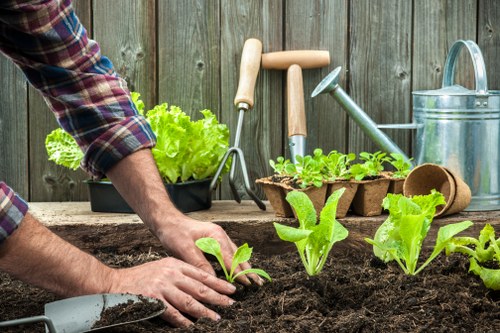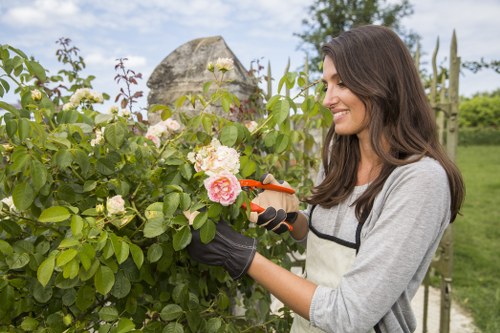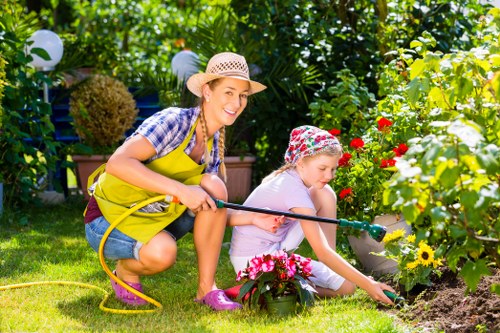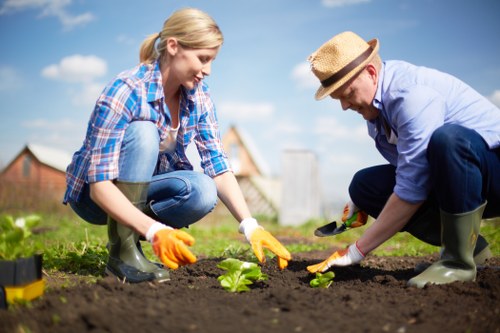Garden Maintenance in Limehouse

Maintaining a beautiful garden in Limehouse requires a blend of careful planning, regular upkeep, and an understanding of the local climate and soil conditions. Whether you’re a seasoned gardener or a beginner, effective garden maintenance ensures that your outdoor space remains vibrant and healthy throughout the year.
One of the first steps in garden maintenance is understanding the specific needs of your plants. Limehouse’s unique environment, characterized by its proximity to the River Thames and urban setting, influences which plants will thrive. Selecting native or well-adapted species can reduce maintenance efforts and enhance the garden’s resilience against pests and diseases.
Regular tasks such as weeding, pruning, and mulching are essential for keeping your garden in top shape. Weeding prevents unwanted plants from competing with your desired flora for nutrients and water, while pruning helps maintain plant health and encourages growth. Mulching not only retains soil moisture but also suppresses weeds and adds organic matter to the soil.

Essential Garden Maintenance Tips
Implementing a consistent garden maintenance schedule is crucial for ensuring that your garden remains attractive and functional. Start by creating a monthly calendar that outlines the tasks you need to perform. This proactive approach helps you stay on top of essential duties and prevents minor issues from escalating into major problems.
**Watering is a critical aspect of garden care.** In Limehouse, where the climate can be variable, it’s important to adjust your watering schedule based on seasonal changes. Early morning or late evening watering reduces water loss due to evaporation and helps plants absorb moisture more effectively.
Fertilizing provides the necessary nutrients for plant growth. Use a balanced fertilizer that meets the specific needs of your garden’s plants. Organic options, such as compost or manure, are environmentally friendly choices that improve soil structure and fertility over time.

Seasonal Garden Maintenance
Each season brings its own set of challenges and opportunities for garden maintenance. **Spring** is the time to prepare your garden by clearing debris, planting new flowers, and pruning shrubs. It’s also the ideal time to fertilize the soil and apply a pre-emergent herbicide to prevent weed growth.
During **summer**, focus on watering, weeding, and pest control. Ensure that your plants receive adequate moisture, especially during hot and dry spells. Regularly inspect your garden for signs of pests and diseases, and take prompt action to mitigate any issues.
**Autumn** involves cleaning up fallen leaves, planting bulbs for spring, and preparing plants for the winter months. Mulching in autumn helps protect plant roots from frost and reduces soil erosion.

Choosing the Right Tools
Having the right tools is essential for efficient garden maintenance. Invest in high-quality equipment that suits the specific needs of your garden. Basic tools include a sturdy shovel, a hand trowel, pruning shears, a hose with adjustable nozzles, and a reliable mower.
Regularly maintaining your tools ensures their longevity and effectiveness. Clean and sharpen blades after each use, and store tools in a dry place to prevent rust and damage.
Ergonomic tools can reduce strain and increase productivity, especially if you have a large garden or undertake extensive maintenance tasks regularly.

Hiring Professional Garden Services
While DIY garden maintenance can be fulfilling, hiring professional garden services in Limehouse offers numerous benefits. **Experienced gardeners** have the expertise to handle complex tasks, diagnose plant issues, and implement effective solutions.
Professional services can provide comprehensive maintenance plans tailored to your garden’s specific needs. This includes regular visits for ongoing care, seasonal clean-ups, and emergency interventions during extreme weather conditions.
Additionally, professionals can offer valuable advice on plant selection, garden design, and sustainable practices that enhance the beauty and functionality of your outdoor space.
Benefits of Regular Garden Maintenance
Consistent garden maintenance offers a myriad of benefits, both aesthetic and environmental. A well-maintained garden enhances the curb appeal of your Limehouse home, creating a welcoming and pleasant environment for you and your guests.
Healthy plants contribute to a thriving ecosystem by attracting beneficial insects, birds, and pollinators. This biodiversity supports natural pest control and promotes plant resilience.
Moreover, a lush garden provides personal well-being benefits. Spending time outdoors in a beautiful garden can reduce stress, improve mood, and encourage physical activity, contributing to a healthier lifestyle.
Eco-Friendly Garden Practices
Incorporating eco-friendly practices into your garden maintenance routine not only benefits the environment but also promotes sustainable living. **Composting** kitchen scraps and garden waste enriches the soil naturally, reducing the need for chemical fertilizers.
**Rainwater harvesting** systems can be installed to collect and store rainwater for irrigation purposes, conserving water and lowering utility bills. Additionally, using drought-resistant plants minimizes water usage and ensures garden sustainability during dry periods.
Implementing **integrated pest management (IPM)** strategies helps control pests with minimal environmental impact. This approach combines biological controls, such as introducing beneficial insects, with mechanical and cultural practices to maintain plant health.
Gardening in Urban Limehouse
Urban gardens in Limehouse present unique challenges, such as limited space and exposure to pollution. Maximizing your garden’s potential involves creative solutions like vertical gardening, container planting, and utilizing rooftop spaces effectively.
Vertical gardens allow you to grow more plants in a smaller area by using trellises, hanging pots, and wall-mounted planters. This approach not only conserves space but also adds visual interest and greenery to your urban environment.
Container gardening offers flexibility and mobility, enabling you to move plants to optimal locations based on sunlight and weather conditions. Choosing the right containers and soil mix is crucial for the success of your container plants.
Planning and Designing Your Garden
A well-designed garden starts with careful planning. Assess your Limehouse garden’s layout, considering factors like sunlight exposure, soil quality, and existing structures. Define the purpose of your garden, whether it’s for relaxation, entertainment, or growing produce.
Creating a garden layout helps organize plant placement, pathways, and functional areas. Incorporate elements such as seating areas, water features, and decorative structures to enhance the aesthetic appeal and functionality of your garden.
Selecting a variety of plants with different heights, colors, and textures adds depth and interest to your garden design. Grouping plants with similar care requirements simplifies maintenance and promotes a harmonious garden environment.

Soil Health and Preparation
Healthy soil is the foundation of a flourishing garden. Conduct a soil test to determine its pH level and nutrient content. Based on the results, amend the soil with organic matter, such as compost or peat moss, to improve its structure and fertility.
Proper soil preparation involves tilling or aerating the soil to enhance drainage and root penetration. Removing weeds and debris ensures that plant roots have unobstructed access to nutrients and water.
Implementing crop rotation and avoiding over-fertilization maintain soil health over time, preventing nutrient depletion and promoting sustainable gardening practices.

Pest and Disease Management
Effective pest and disease management is crucial for maintaining a healthy garden. Regular monitoring allows for early detection of issues, enabling timely intervention before problems escalate.
Biological controls, such as introducing beneficial insects like ladybugs and lacewings, help keep pest populations in check naturally. Additionally, using organic pesticides minimizes environmental impact and preserves beneficial organisms.
Practicing good garden hygiene, including removing diseased plant material and sterilizing tools, reduces the risk of spreading infections and pests throughout your garden.
Lighting and Irrigation Solutions
Proper lighting enhances the beauty and functionality of your garden, allowing you to enjoy it during the evening hours. **Solar-powered lights** are an eco-friendly option that provides illumination without increasing energy consumption.
Installing an efficient irrigation system ensures that your plants receive consistent moisture. Drip irrigation reduces water waste by delivering water directly to the plant roots, while soaker hoses provide gentle and even watering for garden beds.
Automated irrigation systems with timers and moisture sensors optimize water usage, adapting to weather conditions and minimizing manual intervention.
Seasonal Planting and Care
Timing is essential when it comes to seasonal planting and care. Understanding the best times to sow seeds, transplant seedlings, and harvest crops ensures successful growth and yields.
Spring planting includes cool-season vegetables, annual flowers, and perennials that bloom throughout the warmer months. It's also the ideal time to plant fruit trees and shrubs, setting the stage for productive growth in the coming years.
In **summer**, focus on maintaining established plants by providing adequate water and nutrients. This season is also ideal for harvesting vegetables and enjoying the full splendor of your garden’s blooms.

Organic Gardening Practices
Organic gardening emphasizes the use of natural methods to cultivate a healthy and sustainable garden. This approach avoids synthetic chemicals, promoting biodiversity and soil health.
Companion planting involves growing compatible plants together to enhance growth, deter pests, and improve soil fertility. For example, planting basil alongside tomatoes can enhance flavor and repel harmful insects.
Natural fertilizers, such as compost tea and bone meal, provide essential nutrients without harming the environment. These organic inputs support robust plant growth and contribute to a thriving garden ecosystem.
Managing Garden Waste
Proper management of garden waste is vital for maintaining a clean and sustainable garden. **Recycling green waste** through composting transforms organic material into valuable soil amendments that enrich your garden beds.
**Mulch** made from shredded leaves, grass clippings, and other organic matter helps retain soil moisture, suppress weeds, and regulate soil temperature. Applying mulch annually refreshes the soil and reduces the need for additional fertilizers.
For non-compostable waste, consider utilizing local recycling programs or green waste collection services available in Limehouse.

Enhancing Garden Aesthetics
Enhancing the aesthetics of your garden involves adding elements that appeal to the senses and create a harmonious environment. **Colorful flowers**, ornamental shrubs, and decorative structures add visual interest and character to your garden space.
Incorporating features such as water fountains, birdbaths, and garden sculptures can elevate the overall look and provide focal points for your outdoor area.
**Pathways** made from natural stone, gravel, or wood guide visitors through your garden, creating a sense of flow and exploration while protecting plant beds from foot traffic.
Sustainable Gardening Techniques
Adopting sustainable gardening techniques contributes to environmental preservation and promotes long-term garden health. **Permaculture** principles focus on creating self-sustaining ecosystems that mimic natural habitats, reducing the need for external inputs.
Rain gardens collect and absorb rainwater, preventing runoff and reducing the risk of flooding. These gardens utilize native plants that thrive in wet conditions and enhance biodiversity.
**Green roofs** and vertical gardens extend gardening opportunities to urban settings, maximizing space efficiency and providing insulation benefits for buildings.

Community and Garden Resources
Engaging with the local gardening community can provide valuable resources and support. Limehouse offers numerous gardening clubs, workshops, and community gardens where enthusiasts can share knowledge and collaborate on gardening projects.
**Local nurseries** and garden centers are excellent sources for plants, tools, and expert advice tailored to Limehouse’s growing conditions. Building relationships with these establishments ensures access to high-quality products and gardening insights.
Additionally, online forums and social media groups dedicated to gardening in Limehouse facilitate the exchange of tips, experiences, and recommendations among local gardeners.
Patio and Balcony Gardening
For those with limited outdoor space, patio and balcony gardening offer viable options to cultivate a thriving garden. **Container gardening** on patios provides flexibility and ease of maintenance, allowing you to control soil quality and plant placement.
Vertical planters and hanging baskets maximize space by utilizing vertical surfaces for plant growth. This approach creates an aesthetically pleasing and space-efficient garden display.
**Portable furniture** and movable containers enable you to rearrange your garden layout based on sunlight patterns and seasonal changes, ensuring optimal growth conditions for your plants.
Garden Safety and Best Practices
Maintaining a safe garden environment is essential for the well-being of both gardeners and visitors. **Proper tool storage** prevents accidents and extends the lifespan of your equipment. Ensure that all tools are stored securely and kept out of reach of children.
Safe chemical usage involves following label instructions, wearing protective gear, and storing pesticides away from food and living areas. Whenever possible, opt for organic or natural alternatives to minimize health risks.
Implementing **garden lighting** not only enhances aesthetics but also improves visibility during nighttime maintenance tasks, reducing the likelihood of accidents and injuries.

Maximizing Garden Productivity
Maximizing garden productivity involves strategic planning and efficient use of resources. **Succession planting** ensures a continuous harvest by staggering the planting of crops at different times, extending the growing season and increasing yields.
Companion planting not only benefits plant health but also optimizes space utilization. Growing complementary plants together can improve pollination, enhance flavor, and reduce pest infestations.
Utilizing raised beds and intensive planting techniques allows for better soil management and increased productivity per square foot, making the most of your garden space in Limehouse.

Winter Garden Maintenance
Winter presents unique challenges for garden maintenance, requiring adjustments to protect plants and prepare for the coming growing season. **Mulching** heavily around plant bases shields roots from frost and temperature fluctuations.
Pruning dormant trees and shrubs in winter promotes healthy growth in spring and maintains the desired shape and size of your plants.
Protective coverings, such as burlap or frost blankets, safeguard sensitive plants from harsh winter conditions, preventing damage and ensuring their survival until warmer months return.
Gardening Technology and Innovations
Embracing gardening technology can streamline maintenance tasks and enhance garden efficiency. **Smart irrigation systems** equipped with sensors and timers adjust watering schedules based on real-time weather data, conserving water and ensuring optimal plant hydration.
Garden management apps offer tools for planning, tracking plant growth, and managing maintenance schedules. These digital resources provide valuable insights and reminders to keep your garden on track.
**Automated tools**, such as robotic lawn mowers and electric pruners, reduce manual labor and increase precision in garden upkeep, allowing you to focus on enjoying your outdoor space.

Conclusion
Effective garden maintenance in Limehouse requires a combination of knowledge, dedication, and the right tools. By implementing regular maintenance practices, adopting sustainable techniques, and leveraging available resources, you can cultivate a thriving and beautiful garden that enhances your living space and contributes to the local ecosystem.
Whether you choose to maintain your garden independently or enlist the expertise of professional services, prioritizing garden care ensures long-term success and enjoyment. Contact us today to learn more about our garden maintenance services and transform your Limehouse garden into a vibrant oasis.